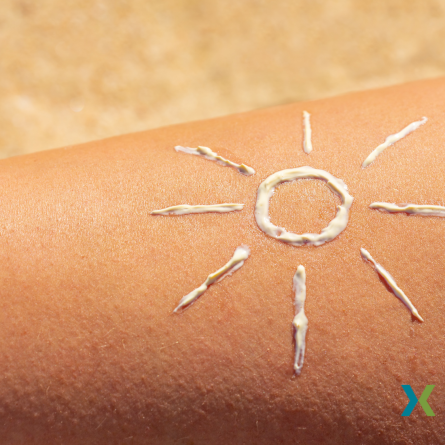Summer is a wonderful time for outdoor activities, but it’s essential to protect your family from the sun’s harmful rays. Sun safety is crucial for preventing skin damage, sunburns, and long-term health issues like skin cancer. At Next Level Urgent Care, we want to ensure you and your family enjoy the sunshine safely. Here are some comprehensive sun safety tips for everyone in your family.
Understanding UV Radiation
The sun emits ultraviolet (UV) radiation, which is the primary cause of skin damage. There are two types of UV rays that affect the skin:
- UVA Rays: These rays penetrate deep into the skin and are primarily responsible for premature aging and wrinkles.
- UVB Rays: These rays are responsible for sunburn and play a significant role in developing skin cancer.
Both types of UV rays can cause skin damage even on cloudy days, so it’s important to take precautions whenever you’re outdoors.
Sun Safety Tips for the Whole Family
- Use Broad-Spectrum Sunscreen
- Choose a broad-spectrum sunscreen that protects against both UVA and UVB rays with an SPF of at least 30.
- Apply sunscreen generously 15 minutes before going outside and reapply every two hours, or more often if swimming or sweating.
- Don’t forget to apply sunscreen to commonly missed spots like the ears, neck, tops of feet, and the scalp (if hair is thin or parted).
- Wear Protective Clothing
- Dress in long-sleeved shirts, long pants, and wide-brimmed hats to cover as much skin as possible.
- Opt for tightly woven fabrics or clothing specifically designed with UV protection.
- Sunglasses with UV protection are essential to protect your eyes from UV rays, which can cause cataracts and other eye damage.
- Seek Shade
- Whenever possible, stay in the shade, especially during peak sun intensity hours between 10 a.m. and 4 p.m.
- Use umbrellas, canopies, or tents when spending extended periods outdoors.
- Remember that sand, water, and snow can reflect UV rays and increase exposure, so take extra precautions in these environments.
- Avoid Tanning Beds
- Tanning beds emit UV radiation similar to the sun and can increase the risk of skin cancer and premature aging.
- Encourage your family to embrace their natural skin tone and avoid the harmful effects of tanning beds.
- Be Sun Smart All Year Round
- UV rays can cause skin damage year-round, even in winter or on cloudy days.
- Make sun protection a daily habit, regardless of the season or weather.
Special Considerations for Children
Children’s skin is more sensitive to UV radiation, so it’s especially important to protect them from the sun.
- Use Kid-Friendly Sunscreen
- Choose sunscreens formulated for children, which are often gentler on the skin and free of harmful chemicals.
- Apply sunscreen to babies over six months old; for younger infants, keep them out of direct sunlight and use protective clothing.
- Set a Good Example
- Teach your children about the importance of sun safety by setting a good example and practicing these habits yourself.
- Make applying sunscreen and wearing protective clothing a routine part of going outside.
- Create Sun Safety Rules
- Establish family rules for sun safety, such as always wearing a hat and sunglasses and reapplying sunscreen regularly.
Treating Sunburn
Despite your best efforts, sunburns can happen. Here’s how to treat them effectively:
- Get Out of the Sun
- At the first sign of sunburn, get out of the sun and seek shade or go indoors.
- Cool the Skin
- Take a cool bath or shower to soothe the skin. Avoid using hot water, which can exacerbate the burn.
- Apply cool, damp cloths to the sunburned areas for relief.
- Moisturize
- Use a gentle, fragrance-free moisturizer or aloe vera gel to keep the skin hydrated.
- Avoid products with alcohol, which can dry out the skin.
- Stay Hydrated
- Drink plenty of water to help your body recover and keep the skin hydrated.
- Pain Relief
- Over-the-counter pain relievers like ibuprofen or acetaminophen can help reduce pain and inflammation.
- Avoid Further Sun Exposure
- Keep sunburned skin out of the sun until it heals completely to prevent further damage.
When to Seek Medical Attention
In some cases, sunburn can be severe and require medical attention. Seek help if you experience:
- Severe blistering or pain
- Fever or chills
- Nausea or vomiting
- Dizziness or confusion
Conclusion
Practicing sun safety is essential for protecting your family’s skin and overall health. By following these tips, you can enjoy outdoor activities while minimizing the risk of sun damage. If you have concerns about a sunburn, visit one of our convenient locations for professional care.
![NL Wordmark [Gradient] NL Wordmark [Gradient]](https://www.nextlevelurgentcare.com/wp-content/uploads/elementor/thumbs/NL-Wordmark-Gradient-7fm1iv6f0zylwqrxpy8kifrnrzsluqzzzofvqvs6smo.png)
